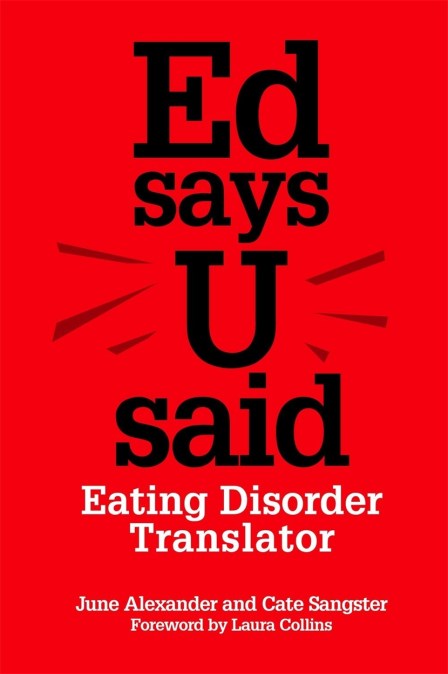When an eating disorder (ED) is involved, the problems caused by miscommunication can have serious consequences. A remark from a parent that is intended as positive encouragement could act as a trigger and a criticism from someone with an ED might really be a cry for help.
This book aims to improve communication between someone with an eating disorder and their friends and family by revealing the eating disorder mind set and decoding language choices. Using examples of real-life, everyday conversations, ED says U said translates the highly charged language of anorexia, bulimia and binge eating disorder and unravels the emotional chaos that can surround sufferers and those who care for them. It provides clear examples of the common pitfalls and gives invaluable advice about how to help in defusing the triggers and regaining the personality swamped by the illness.
A unique resource of information on EDs, this book will be essential reading for everyone who has been affected by eating disorders: sufferers, carers, family and friends, together with health care professionals treating people with eating disorders.
This book aims to improve communication between someone with an eating disorder and their friends and family by revealing the eating disorder mind set and decoding language choices. Using examples of real-life, everyday conversations, ED says U said translates the highly charged language of anorexia, bulimia and binge eating disorder and unravels the emotional chaos that can surround sufferers and those who care for them. It provides clear examples of the common pitfalls and gives invaluable advice about how to help in defusing the triggers and regaining the personality swamped by the illness.
A unique resource of information on EDs, this book will be essential reading for everyone who has been affected by eating disorders: sufferers, carers, family and friends, together with health care professionals treating people with eating disorders.
Newsletter Signup
By clicking ‘Sign Up,’ I acknowledge that I have read and agree to Hachette Book Group’s Privacy Policy and Terms of Use
Reviews
The book offers a greater perspective of how well-intended comment might be misinterpreted by those suffering with and ED and also by friends, family members and healthcare professionals. The authors, Alexander and Sangster, present discussions in the style of social media conversations to highlight the difficulties in a clear, direct way. Food relationships, behaviour and sense of self are discussed in each chapter in relation to early signs, symptoms, treatment and the recovery journey to recovered... Through the words of the sufferers, survivors and carers the authors break down and talk through man of the barriers of communication that can hinder the road to recovery. This book would be useful and beneficial tool for all who are involved with someone who might have and ED, particularly family and friends.
Both writers and women who have struggled with eating disorders (ED), Alexander and Sangster draw from their combined years of personal experience and the stories of contributors to describe the internal dialog of negative, destructive thoughts that ED sufferers commonly experience. They provide examples of both clinical and conversational exchanges, written in the vernacular of social media, to shed light on the communication pitfalls encountered by well-meaning friends and family who don't realize their words can be misinterpreted or even provocative to sufferers who speak a different language. Although this easy-to-read book does an excellent job as a comprehensive resource and offers clear-cut explanations for a complex mental illness, its focus is less on the cultural aaspects of the disorder than, for example, Mary Pipher's Reviving Ophelia. Rather, it focuses on understanding the eating disorder "voice," thus improving communication and breaking down barriers to recover. Verdict: Included tips from survivors of the disorder are especially insightful and helpful. Families and friends affected by eating disorders should benefit from this book.
Communication becomes a core problem for people with eating disorders who often cry: 'You do not listen.' This book bridges this gulf.
Eating disorders are very effective at getting the most rational individual to think in the most irrational of ways. This is confusing to the sufferer and those who attempt to care for the patient, be they parents or professionals. This book will help us all understand these perplexing disorders just a little better.
This innovative and inspirational book is your ticket on a wild ride into the secret world of eating disorders. June and Cate shine a light into the terrible depths but ultimately offer promise to both sufferers and professionals alike - highly recommended.
One of the most difficult aspects of an eating disorder is the way the illness distorts anything and everything that's said to the sufferer. This book will help expose those distortions in a simple but highly effective way. An important read for both clinicians and families.
Focused on providing practical, helpful guidance to use RIGHT NOW, June and Cate delve into what appears to be a vast, even endless, reserve of deeply personal energy, strength, insight, and wisdom to deliver a timely recovery tool that can benefit each party in the treatment process equally - sufferers, survivors, carers, professionals, and whole communities.
Alexander and Sangster have honored the true voice of loved ones and friends with eating disorders by translating their spoken words and nonverbal messages. They've done so with respect and great insight.
Every time someone speaks up, speaks out and shines a light on an eating disorder - the deadly grip of this most challenging illness is weakened. Alexander and Sangster have beamed that light with their compilation of many views, so much hard won insight.
A unique resource of information on EDs, this book will be essential reading for everyone who has been affected by eating disorders: sufferers, carers, family and friends, together with health care professionals treating people with eating disorders.

